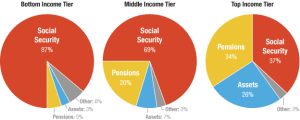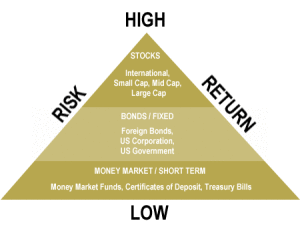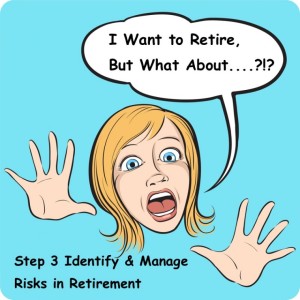 Just read an article about the top five concerns consumers have about their finances and it is not surprising that most people are thinking about – Debt, Savings, Education, Retirement, and Health costs. This chart on the left shows where people expect their income may come from as well as the concerns that they have.
Just read an article about the top five concerns consumers have about their finances and it is not surprising that most people are thinking about – Debt, Savings, Education, Retirement, and Health costs. This chart on the left shows where people expect their income may come from as well as the concerns that they have.
Concerns Consumers have about their Finances
Debt
is something that everyone worries about sometime in their lives. Usually when they overextend themselves and also as they are nearing retirement or are about to lose their jobs. This is where a contingency plan comes in. Plan for losing a job, plan for retirement and try to make sure that you never overextend yourself.
Savings
can tie in with having a contingency plan, but savings also means saving for retirement. If you are going to do it right it means you have several different savings accounts – contingency, vacation, something you want to purchase, major repairs to your home, and retirement. Sounds like a lot but it is pretty basic and if you fail on any of them you will pay the price at some point with some hardship that you did not count on.
Education
is important for the kids. Depending on how many kids you have, your plans for them in terms of education, etc you will want to set aside a savings plan early that is specifically for the kids to get the schooling they need.
Retirement planning
is so important. If you are lucky enough to have a plan at work your among a minority these days. Set aside a minimum of 10% and never touch it. Invest wisely and do not use it until you are getting close to retirement. Then evaluate whether you have enough or not with the help of a financial planner.
Health costs
are a big unknown. One day you are healthy and the next day you have major medical bills. Not everyone can afford to have health insurance, so it is a bit of a gamble. People have been known to be wiped out overnight due to unforeseen health costs.
Concerns Consumers have about their Finances
Develop a Plan and decrease your Worries
Many financial advisers suggest various methods of dealing with these concerns, however, the main thing to do is to have a plan that addresses each of your concerns. No plan, no solution, you are going to be in trouble financially at some point. Put simply the rules are:
- Pay yourself first – a simple but very effective lifelong approach.
- Have a plan – and write/type it out, discuss it with people that you respect
- Learn about tax-saving options
- Make regular contributions to the tax-savings options.
- Pay down your most expensive debts as much and as quickly as you can.
Pay yourself first – a simple but very effective lifelong approach. Figure out a budget and decide how much you can afford. Then pay yourself so that you can enjoy a little bit of life. Just ensure that it is reasonable in relation to the rest of your income.
Have a plan – and write/type it out, discuss it with people that you respect and review it on a regular basis. Some people suggest once per year while others once per quarter. Decide what works for you. If your finances are volatile, then you will want to review your plan more often.
Learn about tax-saving options that are available in your state or province. Decide how to maximize your savings and decrease the amount of tax you pay at the same time.
Make regular contributions to the tax-savings options – Set up a regular deposit to the plan. Your financial institution can help you with this so that it is done automatically and you have a forced savings plan to your tax-advantaged plan
Reduce your most expensive debts as much and as quickly as you can. This in turn will control and decrease the amount of interest you are paying and when the debt is paid off, you will get a major raise in terms of more cash to use on other things.
If you share these financial concerns or have others that we did not mention, why not leave a comment for readers. All well written helpful comments will be accepted even with links. All others will be deleted.
 Everyone is wondering what the long-term BREXIT Impact on Retirement Portfolios will be. Markets were down significantly and then rebounded again. In effect, in the short term, there has been little impact on portfolios so far. But what will the long-term impact be on your retirement nest egg? If anyone tries to tell you they know, don’t believe them. They just cannot predict what will happen in the future. There are so many financial decisions that will be made by governments over the next couple of years, that no one knows. It will take them several years to unwind the UK’s involvement in the EU. So what should an investor do in the meantime?
Everyone is wondering what the long-term BREXIT Impact on Retirement Portfolios will be. Markets were down significantly and then rebounded again. In effect, in the short term, there has been little impact on portfolios so far. But what will the long-term impact be on your retirement nest egg? If anyone tries to tell you they know, don’t believe them. They just cannot predict what will happen in the future. There are so many financial decisions that will be made by governments over the next couple of years, that no one knows. It will take them several years to unwind the UK’s involvement in the EU. So what should an investor do in the meantime?




